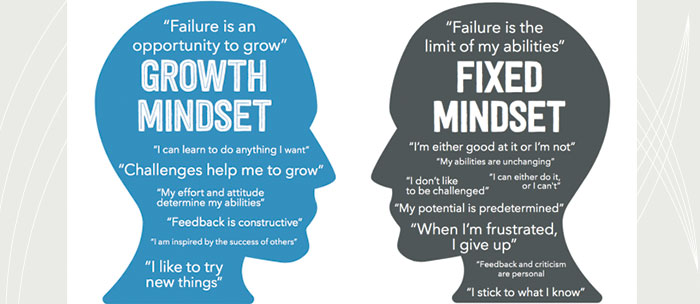Have you ever wondered why people from the same geographic region all have the same dialect or accent?
Turns out human brain is wired to be efficient at learning and copying behaviors from others around them, often times unconsciously. When the learned behavior is a particular way of pronouncing words, the collective effect of unconscious learning is the formation of dialect.
Human’s amazing ability of learning is both a blessing and a curse. Because not all behaviors you learn unconsciously are beneficial. Watch out for the following behaviors you picked up somewhere, because otherwise they may be chipping away your growth opportunities quietly without your notice.
#1: Fixed Mindset
When you tend to say “I’m not good at”, “I always struggle with”, “it is what it is”, etc. you likely have fixed mindset. Fixed mindset is a huge road block for one’s learning and growth.
Mindset: The New Psychology of Success is a book by Dr. Carol Dweck, the Lewis and Virginia Eaton Professor of Psychology at Stanford University. Dr. Dweck described 2 distinct mindsets “growth mindset” and “fixed mindset“. People with growth mindset believe intelligence can be developed and evolved. People with fixed mindset believe intelligence is static and is pre-determined. They confine themselves within a static boundary.
To embrace growth mindset, you should first intentionally be aware of what mindset you have now. Then gradually shift your mindset towards the growth mindset. Lots of real world examples in the book showed how the shift to the growth mindset can unleash amazing potential of people. The best example in tech industry is how Satya Nadella brought growth mindset to Microsoft that helped turn this “titanic” around.

#2: Resisting Feedback
Resisting feedback is one aspect of fixed mindset, but I think it is so important that it deserves its own bullet point here. The reason it’s very hard for people to accept constructive feedback is because it requires one to first overcome his/her own raw animal reflex to “fight or escape when threatened”.
To overcome yourself and effectively accept feedback, you can do the following:
- Develop your awareness of the importance of feedback and your own natural reflex of “fight (defend) or escape (denial)”. Psychologists Joseph Luft and Harry Ingham’s “Johari Window Model” best explains this. Feedback seeking and receiving can help increase the “open area” quadrant and reduce the “blind spot” quadrant. This is crucial for one’s growth.

- Develop your awareness of the negative impact from resisting feedback. Firstly, it’s hard for people to provide constructive feedback to others, so the first reaction you should have upon receiving constructive feedback is to appreciate the effort of the feedback provider and avoid defending yourself. If your first reaction is to explain why you did what you did, it is already regarded as self defense. The only result of the self defense is less and less constructive feedback in the future, which will hinder your growth. Even when there might be some misunderstanding on the feedback provider’s side, try to focus on accepting and appreciating the feedback first. You can lightly touch the misunderstanding part at later part of the conversation while maintaining the tone of appreciating and accepting the feedback.
#3: Falsely Assuming You Have Nailed The Simple Things
When something is hard, people will work hard to achieve it. However, what often trips people is the simple things you falsely assume you have nailed already.

A quick example: Who don’t know how to use a travel pillow? However, a lot of people did it wrong, including me and probably you. It’s just too simple for you to even have a second thought whether you know how to use it properly.
Be super vigilant when your brain makes short-circuit assumptions on simple and fundamental things. Every software engineer “knows” DRY (Don’t Repeat Yourself), but you still see violations a lot in the code. Every software engineer “knows” the single-responsibility principle, but you still see a lot of convoluted designs violating the principle. Everyone “knows” the law of supply and demand, but you will be shocked by how often people ask so many questions that can easily be explained by this law.
#4: Underrating Communication
Many young professionals (including myself during my earlier years of career) focus on delivering the work while underrate communication. Regardless the reason for this, it’s important to start thinking about the important of communication. Otherwise, it could become a significant roadblock for your career at some point.
To help high tech engineers realize the importance of communication, let’s look at a simple analogy. In the Internet and cloud computing era, there are 2 computers with exactly the same hardware except for NIC. One computer has a high speed NIC connected to the broadband Internet, while the other doesn’t have a NIC. It’s very clear the one with NIC can make much higher impact and unleash its computing power to greater extend. It’s the same idea for people in a highly collaborative society.
Conclusion
The common characteristics of these 4 roadblocks for growth is that they camouflage well and overcoming them is easier said than done. So, start focusing on these roadblocks early and treat them with priority.


Great article, Stanley!